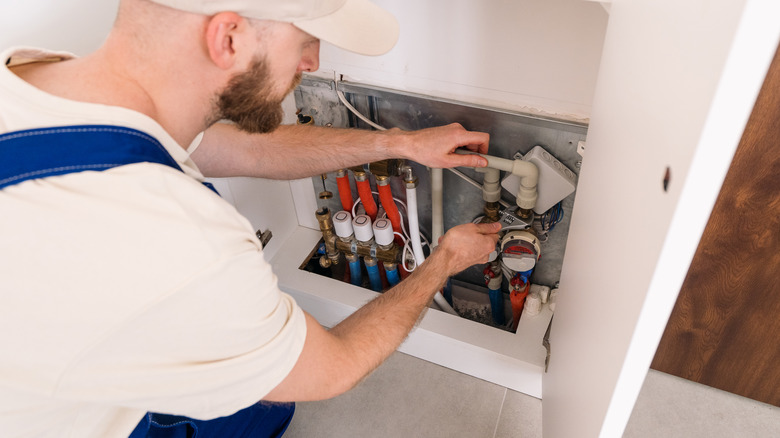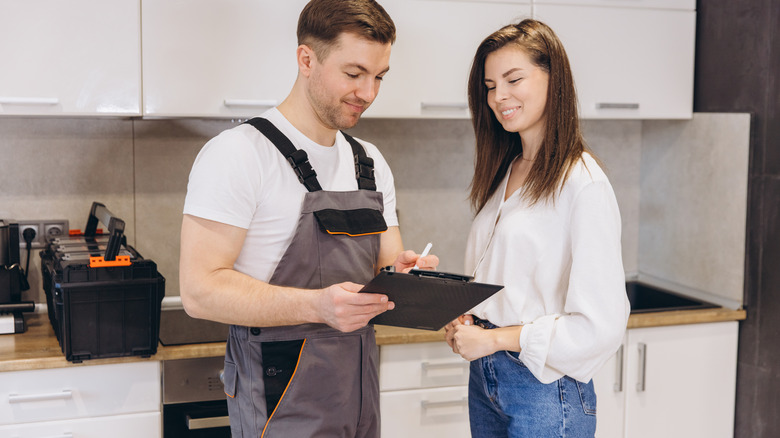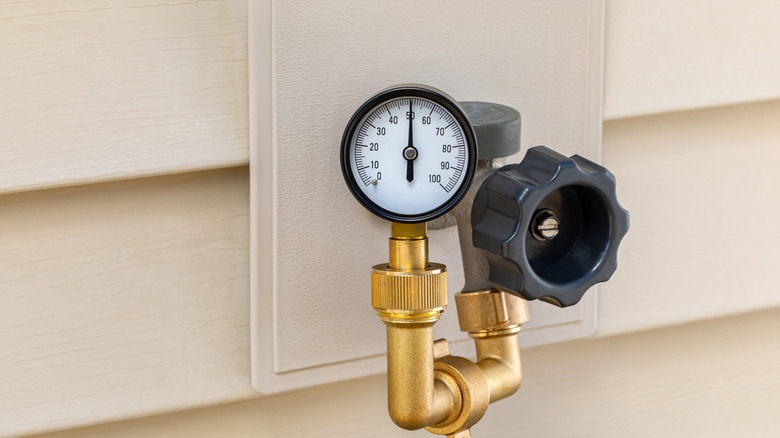Why You Should Schedule A Plumbing Inspection Sooner (Not Later) When Buying A Home
Buying a place you can call your own isn't a small decision. This is why you should inspect every nook and cranny of the house to ensure you get your money's worth. But while you're busy inspecting the landscaping, finding ways to put your stamp on the interiors, and asking a pertinent first-time homebuying question to save over $100,000, you might overlook the plumbing. Since this could disclose leaks and blockages along with electrical and structural problems, you should always schedule a plumbing inspection sooner (not later) when buying a home.
Emphasizing the importance of a plumbing inspection, Joseph Wade, VP of operations at Benjamin Franklin Plumbing, says in his exclusive chat with House Digest, "Delaying a plumbing inspection when purchasing a home can lead to significant financial and structural consequences." Although you might be tempted to take a look at the pipes, fixtures, and water heater yourself to save money on all the extra expenses when buying a home, Wade advises otherwise: "Plumbing issues are often hidden behind walls, under floors, or beneath the ground, making them difficult to detect without a dedicated inspection buy a licensed plumber."
And you should get a plumber to take a look sooner rather than later. "If problems like corroded pipes, root intrusion, failing sewer lines, or outdated fixtures go unnoticed, buyers could inherit costly repairs after closing," says Wade. "In some cases, this could mean thousands of dollars in emergency services or property damage that could have been identified and negotiated before purchase." In short, you'll be saddled with unwarranted plumbing costs since "a delay compromises the buyer's ability to make an informed decision and protect their investment."
When should you schedule a plumbing inspection before a home purchase
Revealing the right time to schedule a plumbing inspection before a home purchase, Wade tells House Digest exclusively, "The ideal time to schedule a plumbing inspection is immediately after an offer is accepted and during the option or due diligence period." Explaining the rationale behind this, he says, "Conducting the inspection early helps avoid rushed decisions or delays at closing and gives both parties time to address any necessary fixes or credits." Wondering if it's actually necessary to contract a professional plumber or whether a regular home inspection is enough? Wade clarifies, "While a home inspection may note obvious plumbing issues, it usually does not include in-depth testing or use of specialized equipment."
To elaborate, a plumbing inspection involves a "video camera inspection of the main sewer line." This will help you note the damage brought about by tree roots, collapsed pipes, or shifting soil so you don't have to splurge for an excavation or a trenchless replacement after moving in. It'll even highlight leaks or burst pipes so you don't have to worry about mold and mildew or bear higher water bills. You also get to determine whether the old water heater will last you a while or whether you will have to replace it soon (they cost between $600 and $3,900). Dated shut-off valves and "galvanized steel, polybutylene, or lead pipes are prone to failure and may need full replacement." Examining water pressure and quality, drainage, and slab leaks will safeguard your investment further. "Buyers may renegotiate the purchase price, request seller-funded repairs, or even choose to walk away," says Wade.
What to do if your deal is about to close and you haven't scheduled a plumbing inspection
While it's ideal you schedule a plumbing inspection immediately after your offer gets accepted, you can still prevent buyer's remorse on your home purchase. "If you're close to closing and haven't completed a plumbing inspection, act immediately," Wade suggests in his exclusive chat with House Digest. "Request a rush inspection from a licensed plumbing professional — even in the final days. Many plumbing companies offer expedited services for situations like this." Although a rush job might cost you extra, it'll still save you money in the long-term. Not having to pay for the associated repairs and remediations out of your pocket soon after you buy a house will take a load off your shoulders.
But if you're too far along and "a full inspection isn't possible, at the very least, prioritize a sewer camera inspection and water pressure test." The first test will divulge major problems with the plumbing, whereas the latter will let you know if taking a shower or washing your dishes will frustrate you (due to low water pressure). "Delaying the inspection further risks inheriting costly problems, and while not ideal, a quick evaluation can still offer peace of mind or last-minute leverage," offers Wade. There's another tip you can employ to ease some financial burden off future you. "Additionally, consider negotiating an escrow holdback or a written agreement with the seller to address any future plumbing-related repairs that may arise," he concludes.


